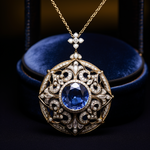Grand Collection
The Grand Collection is the official state art collection of Velikoslavia and is regarded as one of the largest and most valuable art collections in the world. It is considered officially under the ownership of whoever sits on the Sapphire Throne.
The collection is exclusively maintained for use within Velinov Palace and was established when the palace was built in order to furnish and decorate the facility for the various seasons, occasions, and events. A board of four officials, known as the Council of Decorators, maintains a number of interior designers, historians, and experts in order to maintain and handle the collection. Traditionally, most Imperial Residences are redecorated at least once yearly, though parts of these facilities are redecorated far more regularly, and a few are rarely redecorated. It is made up of over one million objects, including 10,000 paintings, 170,000 works on paper, which includes 40,000 drawings and paintings and 500,000 photographs and 800,000 works of art, including tapestries, furniture, ceramics, textiles, carriages, weapons, armor, jewelry, clocks, musical instruments, tableware, plants, manuscripts, books, and sculptures.
Various facilities house the collection and some are on public display in various museums across Velikoslavia. The entire collection is rotated through the Imperial Gallery in Kollavik, where pieces not in use as decor are displayed for all to see. Many pieces of the collection are on display throughout Several thousand objects are also on loan to various museums and collections throughout the world.
History
Collection
Gemstone Trust
Imperial Costumery
Ownership
The Grand Collection is currently held in trust after Alexis I the Preeminent, along with the support of the Council of Nine, set up the Sapphire Trust in 1748 and transferred all of what was considered "property, lands, objects, and livestock that could reasonably be considered owned by the ruling monarch of the empire". This set a number of palaces, livestock, paintings, jewelry, and other items of value under the management of the trust rather than under direct ownership of the Tsar, which insulated the collection through changing dynasties and internal upheaval. It is managed by the Sapphire Trustees Board, which typically includes the Tsar, Tsaritsa, and five other experts of renown that supervise the collection and release requested items to the Council of Decorators and other requestees. Though the other five members handle the affairs, and the monarchs abstain in absentia, there are times when one or both monarchs will intervene in a vote. Both are also allowed to overrule a vote and the Tsar and Tsaritsa may make decisions regarding the collection, and often do, though the Tsar generally has the final say.
Membership on the board is a perk of office for both the Tsar and Tsaritsa and, historically, both offices have been the primary contributors to the collection. Any item that is considered a part of the Velikoslavian state collection that is necessary for office, such as the Crown Jewels of Velikoslavia, are a part of the collection. The current Tsar, Alexis V, has acquired several new high-profile pieces in recent years for the collection. The largest contributions of the 20th century came from Nicholas II of Velikoslavia, who, in his short twenty years on the throne, contributed over 30,000 new pieces.
Management
Council of Decorators
Master of Acquisition
Notable Pieces
Paintings, prints, and drawings
Jewelry
Maria's Star
Containing one of the largest cut sapphires in the world, Maria's Star was a pendant that Alexis I had commissioned for his youngest daughter as a birthday present. It is believed the sapphire was originally mined in Ludvosiya at the Vonich Mine near the southern coast and gifted to the Tsar by a local noble lord seeking to incur favor. The court jewelers of the day set the sapphire in a flower pendant of gold and diamonds and designed it to be worn on a chain. The clasp where the chain was attached was topped by another flower of diamonds which was connected to the top of the pendant. After Maria's death, the pendant was passed onto the collection where it resides today. It is currently part of the jewels regularly worn by the Tsaritsa.
